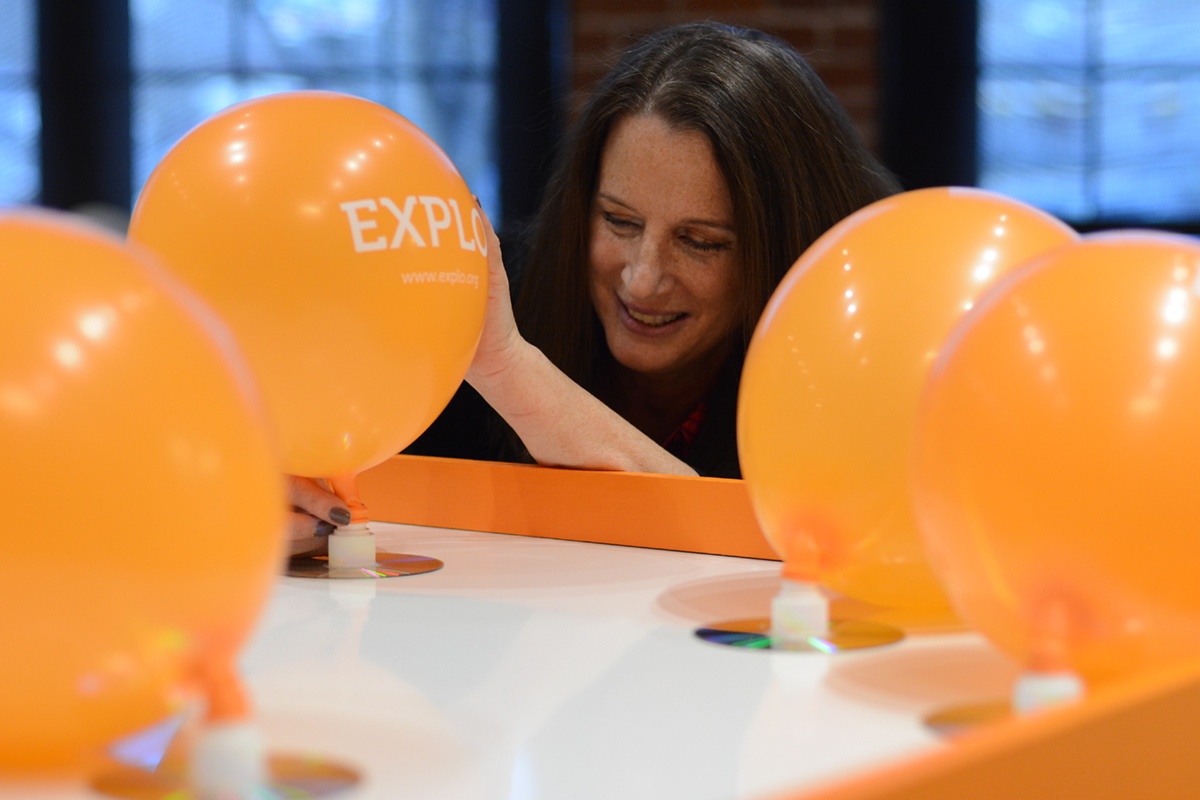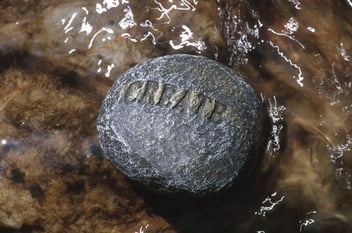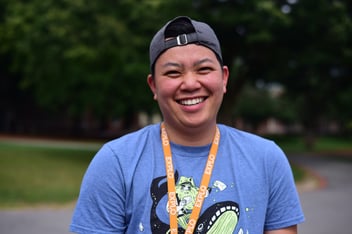On Curriculum + Instruction: An Interview with Barb Trainor

Barb Trainor is Explo's Director of Curriculum and Instruction. A master teacher who believes in hands-on learning, Barb is resourceful, fun, and excited about her work with young teachers. We recently sat down with her to ask her a few questions.
What drew you to building a career in education?
I got into education because I wanted to get kids excited and curious about learning. Coming to Explo allows me to do that without other year-round school stuff getting in the way. It also allows me to have a larger footprint than I did before. I could impact a hundred and twenty kids a year in my teaching job. Here, I get to impact our curriculum advisors who are mentoring our teachers during the summer, and the teachers — they're going out and they're impacting over three thousand kids every summer.
I also know that our curriculum advisors, when they’re going back to their schools, they teach differently because they've spent time with us. It's that kind of building of this movement that has really been very rewarding coming here. This is the reason why I got into education.
What do you see as the mission of the Explo Curriculum Department?
The mission of this department is to provide students with learning experiences they can't find in other places.
To get them — even if they've always hated the idea of learning (or even if they've loved it) — to see learning through a different lens. To get them excited about what they're doing and confident in their ability to learn new things and try new things — even if it makes them uncomfortable. To get them to take appropriate risks in their learning and to take charge of what they’re learning, so much so that they're not waiting to be passively fed information, but are actively going out and seeking it.
What excites you the most about what you're doing?
Everything. [laughs] What excites me the most? Having that kind of impact. Being in a place where, instead of following the pack, which I was doing more of when I was a teacher, I can feel like I'm closer to being in the front of the pack.
It's because this organization is in the front of the pack that allows me to be there. To me, that's very exciting — that we're always pushing to look beyond what's being done in schools.
As schools begin to catch up — when we do something very cool a few years ahead of a school and then the school catches up — we have to reach even further. And that challenge of always reaching for what's better, what's different, what's cutting edge is thrilling. That's something I look forward to, whether it's in a class or in a professional development workshop — it's just exciting to be out on that front edge.
The Explo Curriculum Department
Featuring a year-round staff of six (going on seven), Explo is one of the few summer programs in the country with a full-time curriculum department committed to creating innovative curriculum and staying abreast of the latest developments in learning and teaching.
During the summer, our Curriculum Department expands to include more than 30 professional educators who live on-site at our three campuses and work as hands-on teaching mentors for our instructors.
Interested in learning more about our summer Curriculum Advisor position? See our Faculty Hiring page.
In regards to how Explo teaches versus how the rest of the world teaches, what concerns you about what's happening outside of these walls?
What's really concerning is that kids are not being taught how to think and how to problem solve. They're being taught what to think.
If you're teaching to a test, you're being taught the answers to the test. There's too little authentic assessment. There's too little of putting the student in that situation and asking them to solve a problem using the knowledge that they've been taught. There's more of, here's the knowledge, now give it back to me in a different format, such as an essay instead of a fill-in-the-blank. Whereas at Explo, we're teaching students more about how to apply their knowledge, and putting them in more realistic situations where they have to make a pitch to a marketing team or they need to design that rocket.
We're allowing them the freedom to problem solve around that, given these materials, or even sometimes not given the materials. What are the materials you need? If it's a science engineering course, putting them through the engineering design process where they're going to design, build, test, and redesign based on the test results. They can use that kind of process in marketing, in writing, in so many other things they can use that same "design it, do it, now improve upon it," as opposed to "everyone follow this same recipe and see what happens."
If we're doing a cooking class, everyone's not given a recipe. They're taught the background of what the ingredients will do — or they'll discover that through trial and error — and then they have to build a recipe. If I'm given a recipe and I'm a good reader, I'm always going to get it right, but I may not know why it's happening; same thing with everything else we teach.
If you give the kids the instructions for the rockets and they follow them and the rockets all blast off, you can't assume that the kids knew how to build the rocket, that they understand what's going on behind the science. What you can assume is that they could read and follow directions. I think too much of education is more geared towards "read and follow directions" then "break out into new territory." Break out into new territory — that creates the kinds of leaders and scientists and musicians and creative people we want to be raising.
Do you see our approach to education having a greater effect on the world? If so, how and why?
Absolutely. By teaching students how to think and how to problem solve, we're going to give them the tools they'll need to create a better world, rather than the more defeatist attitude of relying on existing ways of doing things to solve the world's problems.
Teaching a generation of students old answers is not the way to go. Teach them the old answers, but then help them use that information. Teach them how to problem solve and how to think, instead of what to think. That's going to make the world a better place.
These are the problem solvers of the next generations. It's our responsibility, as this generation, to be preparing them to solve problems that we don't even know are going to exist yet. When you're looking at a generation facing the kinds of things we can imagine that they'll be facing, they need to be problem solvers. They need to have grit. They need to be thinkers. It's our responsibility to get them there.
What inspires you to keep going every day?
That's such an easy question. It's inspiring to be surrounded by the kinds of people that Explo employs. It's inspiring to be around the kids that want to attend Explo. It's an easy place to come to work. It allows for the kinds of creative outlets that I know I need. It's a place where even the most obscure, bizarre idea can find a hold in reality and can become something and something exciting for kids.
About Barb Trainor
Entering her ninth year with Explo, Barb Trainor has taught teacher workshops and been a staff development instructor at the Christa McAuliffe Technology Conference, New England College, and the State University of New York at Stony Brook. During her tenure at public schools in New Hampshire, Barb developed and implemented multi-disciplinary curricula, created a district-wide staff mentor program, and started a student peer tutor program. Through Illinois State University, Barb piloted new math and science curricula with a focus on integrating technology into the classroom. Barb earned her B.S. in Biology at Cornell University and her Master of Arts in Education, with a concentration in mathematics, at New England College.


